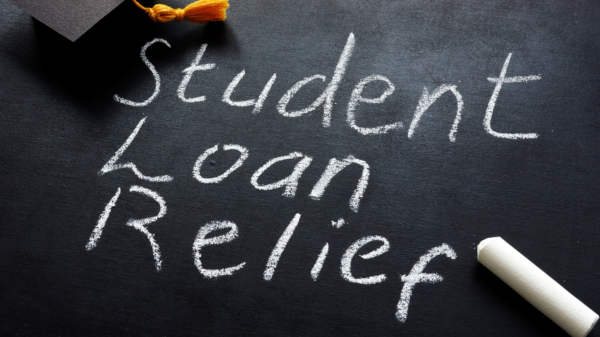Against the latest student-loan “forgiveness” scheme: the Biden administration’s plan is both illegal and foolish, says the Martin Center. (Testimony)
by George Leef
The Martin Center opposes the Biden administration’s new loan-forgiveness rules for two basic reasons: They are outside of the Department of Education’s authority, and they will have adverse consequences.
Legal Authority
Economists often refer to special-interest legislation—bills passed to favor some politically influential group with benefits extracted from society in general. The nation’s Founders were well aware of that prospect and sought to prevent it in their writing of the Constitution. In Federalist 10, James Madison wrote about the evils that arise when “factions” can use governmental power to enrich themselves at the expense of others. The Constitution’s limitations on and division of federal authority were adopted to head off that problem.
The proposed loan-forgiveness “rules” clearly amount to the making of new law by unelected bureaucrats.FacebookTwitterEmailPrintShareIn the Department’s proposed student-loan regulations, we have something even worse than special interest legislation, namely special interest regulation. We say this is worse because, with legislation, it is at least possible to vote out of office those who passed the odious bill and replace them with representatives more committed to the general welfare. With regulations decreed by unelected bureaucrats, that possibility does not exist.
The Founders sought to minimize the chances for special-interest legislation by drawing a line between the legislative and executive branches. Only the former was authorized to make laws, and then only within strictly defined boundaries. The executive branch was given the authority to enforce duly enacted laws. The proposed rules, however, clearly amount to the making of new law.
Even if it were within the purview of Congress to pass a law relieving certain individuals of their obligation to repay debts owed to the government, it is not permissible for an agency of the executive branch to do so. (We say “even if” because the Constitution confers no authority on any branch of the federal government to lend money. While Article II covers the power to spend in detail, the Constitution is silent as to any power to lend. Had the Founders wanted to include such power, they would have said so and set forth rules for it. They did not.)
In recent years, the Supreme Court has taken an interest in abuses of authority by executive-branch agencies. In West Virginia v. Environmental Protection Agency (2022), the Court ruled that “major questions” of public policy have to be decided by Congress, not by agencies. We maintain that the new rules on student-loan repayments are of such importance that they constitute “major questions” and therefore cannot be implemented by agency rules.
The Department of Education is no more able to waive student-debt payments that are owed to the government than it or any other executive-branch agency could waive taxes for select groups. The power of the purse belongs to Congress, and the Education Department cannot forgive billions of dollars owed by student debtors. This transparently political action constitutes another assault on the concept of representative democracy.
Adverse Consequences
Turning to the substance of the rules, we find them equally objectionable.
One proposal is to waive all interest accrued for student debtors up to $20,000. Since many student debtors with accrued interest are able to continue paying down their balances, this amounts to nothing more than a gift to successful people, at the expense of many Americans who never borrowed for college or who paid back their debts. Such vicarious generosity is plainly unfair.
No legitimate public-policy goal is furthered by this gift.FacebookTwitterEmailPrintShareAnother proposal would forgive debt balances for student borrowers who have been paying on their loans for 20 years. Again, many of those individuals are successful and quite able to continue paying back their loans. No legitimate public-policy goal is furthered by this gift.
Another proposal allows the secretary of education to forgive student debts where the borrowers are “experiencing hardship.” This vague provision would be unjustified even if it applied only to individuals on the verge of default, since paying the costs of poor borrowing decisions is a part of adult life. There is no policy reason why poor educational borrowing should be singled out. But this open-ended power in the Department is apt to be used to reward more and more borrowers who can’t easily repay what they owe.
Another proposal would automatically enroll all borrowers in the government’s income-driven repayment (IDR) program whether they have applied or not. The IDR rules are so extremely favorable that they amount to virtually free college for many individuals who will earn moderate incomes. Automatically enrolling every borrower will mean that more Americans who choose to borrow for college will be able to slough off most of their cost onto the taxpayers.
That exacerbates the serious disadvantages of these easy IDR plans.
One disadvantage is that students will be less cost-conscious than otherwise, knowing that they won’t have to worry about their college costs. Some will undoubtedly borrow more heavily to afford a more pricey school and lavish lifestyle than they would if they knew their choices would come at their own expense. Milton Friedman’s line that no one spends other people’s money as carefully as he spends his own applies here.
Another disadvantage is that colleges and universities will have less incentive to minimize their costs, knowing that more and more students will be counting on a largely free education.
In sum, these proposed rules will do nothing to encourage students or schools to be cost-conscious, thus ensuring that still more borrowers in the future will be clamoring for relief from the government when their educational “investments” don’t turn out well.
George Leef is director of external relations at the James G. Martin Center for Academic Renewal.
Originally published by The James G. Martin Center for Academic Renewal. Republished with permission.
For more School Reform News.








